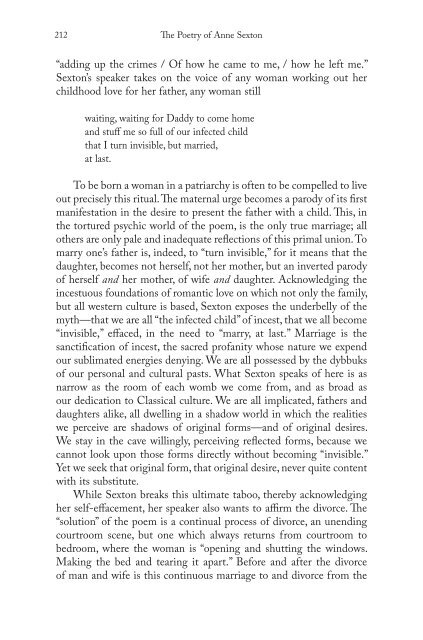Bloom's Literary Themes - ymerleksi - home
Bloom's Literary Themes - ymerleksi - home
Bloom's Literary Themes - ymerleksi - home
You also want an ePaper? Increase the reach of your titles
YUMPU automatically turns print PDFs into web optimized ePapers that Google loves.
212<br />
The Poetry of Anne Sexton<br />
“adding up the crimes / Of how he came to me, / how he left me.”<br />
Sexton’s speaker takes on the voice of any woman working out her<br />
childhood love for her father, any woman still<br />
waiting, waiting for Daddy to come <strong>home</strong><br />
and stuff me so full of our infected child<br />
that I turn invisible, but married,<br />
at last.<br />
To be born a woman in a patriarchy is often to be compelled to live<br />
out precisely this ritual. The maternal urge becomes a parody of its first<br />
manifestation in the desire to present the father with a child. This, in<br />
the tortured psychic world of the poem, is the only true marriage; all<br />
others are only pale and inadequate reflections of this primal union. To<br />
marry one’s father is, indeed, to “turn invisible,” for it means that the<br />
daughter, becomes not herself, not her mother, but an inverted parody<br />
of herself and her mother, of wife and daughter. Acknowledging the<br />
incestuous foundations of romantic love on which not only the family,<br />
but all western culture is based, Sexton exposes the underbelly of the<br />
myth—that we are all “the infected child” of incest, that we all become<br />
“invisible,” effaced, in the need to “marry, at last.” Marriage is the<br />
sanctification of incest, the sacred profanity whose nature we expend<br />
our sublimated energies denying. We are all possessed by the dybbuks<br />
of our personal and cultural pasts. What Sexton speaks of here is as<br />
narrow as the room of each womb we come from, and as broad as<br />
our dedication to Classical culture. We are all implicated, fathers and<br />
daughters alike, all dwelling in a shadow world in which the realities<br />
we perceive are shadows of original forms—and of original desires.<br />
We stay in the cave willingly, perceiving reflected forms, because we<br />
cannot look upon those forms directly without becoming “invisible.”<br />
Yet we seek that original form, that original desire, never quite content<br />
with its substitute.<br />
While Sexton breaks this ultimate taboo, thereby acknowledging<br />
her self-effacement, her speaker also wants to affirm the divorce. The<br />
“solution” of the poem is a continual process of divorce, an unending<br />
courtroom scene, but one which always returns from courtroom to<br />
bedroom, where the woman is “opening and shutting the windows.<br />
Making the bed and tearing it apart.” Before and after the divorce<br />
of man and wife is this continuous marriage to and divorce from the
















